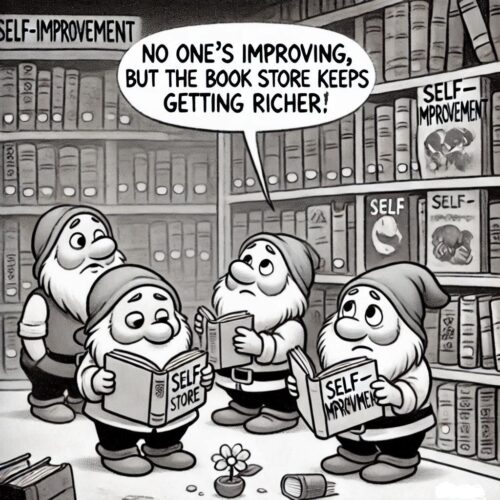The Gospel of Self-Improvement: Is It Just a Pack of Lies?
*Editor’s Note: This post is part of our series, ‘Satan’s Lies: Common Deceptions in the Church Today’…
In a world obsessed with self-optimisation, “you can do it” mantras echo from every corner. From bestselling books promising to unlock your hidden potential to Instagram gurus selling the secrets of success, the self-improvement industry has become our culture’s new religion. At over USD 1 billion annually, this industry isn’t just big business—it’s become the default gospel of our age.
But what if this gospel isn’t good news at all? What if, instead of liberation, it’s actually enslaving us to impossible standards and false hopes?
The Gospel of Self-Improvement: What It Preaches
The modern self-help movement preaches a seductive message: you have everything you need within yourself. Your potential is limitless. All you need is the right mindset, enough willpower, and perhaps a USD 997 course from the latest guru. Whether it’s Tony Robbins encouraging you to “unleash the power within” or manifestation advocates telling you to “speak your truth into existence,” the core message remains consistent: you’re your own saviour.
This gospel comes wrapped in various packages:
- Positive psychology that denies the reality of human nature
- New Age spirituality that deifies the self
- Motivational speaking that promotes a prosperity gospel without Christ
- Wellness culture that promises salvation through self-care
The Biblical Reality Check
Reformed theology offers a radically different perspective on human nature and transformation. Far from having limitless potential, Scripture teaches us we’re radically corrupted by sin. The Bible’s diagnosis isn’t that we need more self-belief—it’s that we need a new self entirely.
The doctrine of total depravity isn’t just theological jargon. It’s a precise description of our inability to improve ourselves into righteousness. No amount of positive thinking can change what Paul describes in Romans 3:10-12: “None is righteous, no, not one… no one does good, not even one.”
This isn’t pessimism—it’s reality. And it’s actually liberating. When we stop trying to be our own saviours, we can finally look to the true Saviour.
True Transformation: God’s Way
Real change isn’t found in self-improvement but in Spirit-wrought sanctification. This transformation differs from self-help in several crucial ways:
- The Source: Not our willpower but God’s grace
- The Process: Not self-actualisation but mortification of sin and vivification in Christ
- The Goal: Not self-fulfilment but God’s glory
Unlike the individualistic focus of self-help, biblical transformation happens in community. The church isn’t an optional add-on but the essential context for growth. We need fellow believers for encouragement, accountability, and the mutual ministry of God’s Word.
What About Common Grace?
Does this mean we should dismiss everything from the self-improvement world? Not necessarily. God’s common grace means that even non-Christian sources can offer helpful insights about habits, productivity, and personal development.
However, these insights must be:
- Filtered through Scripture
- Stripped of their humanistic foundations
- Subordinated to the supreme goal of knowing Christ
A Better Way Forward
Instead of chasing self-improvement, we need to pursue Christ-centred transformation. This means:
- Acknowledging our complete dependence on God’s grace
- Engaging with God’s appointed means of growth: Word, prayer, and sacraments
- Participating in church community rather than pursuing lone-ranger development
- Setting goals that align with God’s purposes rather than worldly success
The True Path to Change
The irony is, real, lasting change comes precisely when we stop trying to change ourselves. When we abandon self-salvation projects and trust in Christ’s finished work, we find what the self-help industry can never deliver: true transformation.
This transformation isn’t about unleashing our inner potential—it’s about being conformed to Christ’s image. It’s not about self-actualisation but about dying to self and living to God. And unlike the false promises of self-improvement, this change is guaranteed because it depends not on our strength but on God’s faithfulness.
Conclusion: Beyond Self-Improvement
The gospel of self-improvement is indeed a pack of lies—but thank God there’s a better gospel. Where self-help says “try harder,” Jesus says “It is finished.” Where self-improvement demands payment, grace offers a free gift. Where self-actualisation leads to exhaustion, Christ promises rest for weary souls.
So let’s abandon the false gospel of self-improvement and embrace the true gospel of grace. After all, we don’t need a better version of ourselves—we need a Saviour. And in Christ, that’s exactly what we have.
Practical Application: Before reaching for that next self-help book, ask yourself:
- Does this resource acknowledge human sinfulness and limitation?
- Is transformation presented as self-achieved or Spirit-wrought?
- Does it point to Christ or to self?
- Is the goal God’s glory or personal glory?
The Gospel of Self-Improvement—Related FAQs
Can’t positive thinking help overcome depression and anxiety? While managing our thoughts has biblical merit (Philippians 4:8), merely thinking positively can’t address the deep spiritual and physiological realities of mental health challenges. True hope comes from anchoring our identity in Christ’s finished work rather than our emotional state, though this doesn’t negate the value of professional medical care when needed.
- What about setting goals and personal development plans? Setting goals and planning can reflect good stewardship of the gifts and calling God has given us. However, we must hold these plans loosely, submitting them to God’s sovereign providence and remembering that our chief end is His glory, not our accomplishment.
- Isn’t self-care biblical since we’re supposed to be good stewards of our bodies? Taking care of our physical and mental health is indeed part of stewarding God’s temple, but modern self-care often becomes self-worship in disguise. True self-care flows from seeing our bodies as instruments for God’s service rather than ends in themselves.
How do I know if I’m growing spiritually without focusing on self-improvement metrics? True spiritual growth is measured by increasing Christ-likeness – particularly in humility, love for others, and hatred of sin—rather than achievement metrics. The greatest evidence of growth is often a deeper awareness of our need for grace rather than confidence in our progress.
- What’s wrong with wanting to become a better person? The desire to grow in godliness is good, but we must recognise true transformation comes through dying to self rather than improving self. Our goal isn’t to become better versions of ourselves but to decrease so Christ might increase.
- Should Christians avoid all self-help resources and personal development programs? We can glean practical wisdom from various sources while rejecting their underlying humanistic philosophies. The key is maintaining biblical discernment and ensuring these resources remain tools for godly living rather than becoming alternative gospels.
How does this perspective apply to teaching children about personal growth and development? Children should be taught their value comes from being made in God’s image and loved by Him, not from their achievements or self-improvement. Teaching them responsibility and discipline is important, but it should always point them to their need for grace rather than self-sufficiency.
The Gospel of Self-Improvement—Our Related Posts
Editor's Pick

Monergism vs Synergism: Is Salvation God’s Work Alone?
When God saves us, does He do it alone, or does He need our help? The question isn’t mere theological [...]

Was Jesus Abandoned by the Father on the Cross?
WHY WE ANSWER IN THE NEGATIVE “My God, my God, why have you forsaken me?” These words from the cross [...]

Why Do Some Respond to God’s Call While Others Don’t?
THE REFORMED VIEW ON OUTWARD AND INWARD CALLS EXPLAINED Picture this: Two neighbours attend the same church service. They hear [...]

Does Ocean Salt Content Prove a Young Earth?
A COMPELLING LOOK AT MARINE CHEMISTRY AND EARTH’S TIMELINE The Salt Question That Challenges Deep Time: If Earth’s oceans have [...]
Noah’s Flood: Where Did All the Water Come From? And Go?
The question hits every Bible-believing Christian at some point: “If Noah’s flood covered the whole earth, where did all that [...]

No Marriage in Heaven? What Does Mark 12:25 Mean?
“Will I see my spouse in heaven? Will we still be married?” These questions pierce the heart of every Christian [...]

The Terror of Meeting God: What Isaiah 6 Reveals About Divine Holiness
WHEN ‘WOE IS ME’ IS THE ONLY PROPER RESPONSE TO A GLIMPSE OF GOD Picture this: You’re a prophet of [...]

Is the Holy Spirit Present in Unbelievers? The Biblical Answer
Can someone who doesn’t believe in Jesus Christ have the Holy Spirit living inside them? This question strikes at the [...]

The Gap Theory Exposed: Why Embrace a Young Earth?
The Gap Theory proposes there’s a vast time gap—millions or billions of years—between Genesis 1:1 (“In the beginning God created [...]

Rethinking Sickle Cell Anaemia: A Case for Intelligent Design
Sickle cell anaemia presents what many consider evolution’s strongest card—a genetic condition that causes suffering yet provides protection against malaria. [...]
SUPPORT US:
Feel the Holy Spirit's gentle nudge to partner with us?
Donate Online:
Account Name: TRUTHS TO DIE FOR FOUNDATION
Account Number: 10243565459
Bank IFSC: IDFB0043391
Bank Name: IDFC FIRST BANK







